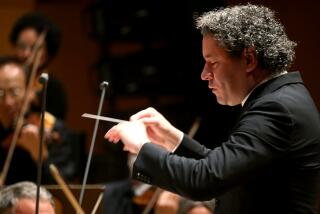MARTIN/WATANABE/PERRY TRIO
- Share via
Robert Martin may have retired from the Sequoia Quartet, but that, happily, hasn’t interfered with his impulse to play chamber music.
Sunday, the cellist and his friend of 25 years, Miwako Watanabe (the Sequoians’ second violin), joined pianist Antoinette Perry for an afternoon of Beethoven at Gindi Auditorium. It was a superb performance of great music, the kind that makes a listener glad to be alive and receiving such a gift.
It was also the first of three concerts surveying Beethoven’s trio cycle, along with choice bagatelles. Martin produces the series, a sort of family affair with his and Watanabe’s children acting as ushers. So far the trio is nameless. But time may change that.
Meanwhile, the first event offered a shrewdly chosen and ordered bill: an early and a middle trio, interspersed with a set of variations and a charming Allegretto written for the daughter of Beethoven’s “Immortal Beloved.” On paper, especially with Michael Steinberg’s illuminating program notes, and in performance, the agenda was nothing if not engaging.
In the C-major Trio, Opus 1, Watanabe and Martin voiced their long-standing rapport. Her pure, singing tone and his light, refined approach combined perfectly. The unfamiliar element, Perry, turned out to be just as complementary, with the pianist demonstrating both a sterling technique and the necessary musical authority to glue things together.
By following with the variations on “Ich bin der Schneider Kakadu,” Opus 121, the nameless trio brought delightful contrast. Here was Beethoven utterly ingratiating in its directness, balancing melodrama with playfulness and elegant languor.
The little Allegretto also served as a reminder that not everything Beethoven wrote dealt with weighty philosophy. On its heels, however, came the D-major Trio, Opus 70 (“Ghost”), which Perry drove along with verve. If Watanabe and Martin may not always have produced a big enough tone to suggest its great, sweeping gusts they more than compensated with an emotional breadth and visceral propulsion--not to mention the tensely haunting Largo for which the work is named.
More to Read
The biggest entertainment stories
Get our big stories about Hollywood, film, television, music, arts, culture and more right in your inbox as soon as they publish.
You may occasionally receive promotional content from the Los Angeles Times.










